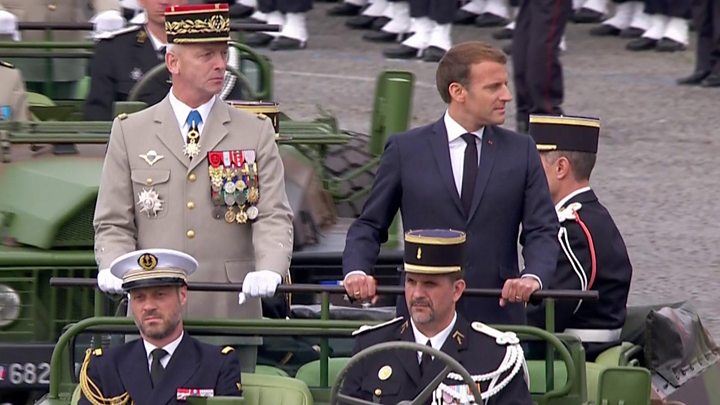Home » World News »
France honours health workers on Bastille Day
France has honoured its health workers at scaled-down events to mark the national celebration Bastille Day, amid the ongoing coronavirus pandemic.
Authorities cancelled the traditional military parade but instead held a tribute to those tackling the virus.
Invited audience members included families of French workers who died of Covid-19.
The annual events mark the storming of Bastille prison on 14 July 1789, seen as the start of the French Revolution.
It is the first time officials have called off the annual military parade through the capital Paris since the end of World War Two in 1945.
President Emmanuel Macron gave a rare televised interview after ceremonies in the morning, in which he answered questions about the coronavirus pandemic and the state of the economy.
How has France been celebrating?
Around 2,000 French soldiers gathered for a ceremony in the Place de la Concorde.
It began with a tribute to Gen Charles de Gaulle, who 80 years ago famously called on France to resist the Nazi German occupation in a radio address from the BBC in London.
Though there has been no parade on the Champs-Elysées, the troops were honouring all those mobilised to tackle the coronavirus outbreak – including health workers and the armed forces.
It comes the day after the French government agreed on pay rises worth €8bn (£7.2bn; $9bn) for French health workers.
A traditional fly past included military aircraft as well as a transport plane used to carry Covid-19 patients at the height of the pandemic in France.
Some 2,500 specially invited audience members – including the families of health workers who died during the pandemic – watched events from socially-distanced seating.
Officials from four nations who took in French patients – Austria, Germany, Luxembourg and Switzerland – were also invited to watch.
Events have been closed to the public, although they were televised. Many areas of Paris have been shut to prevent crowds gathering.
Traditional fireworks by the Eiffel Tower will take place at 23:00 local time (22:00 BST) as a “symbol of the resilience of our capital and our nation and a tribute to all the everyday heroes who worked during the duration of the epidemic”, a joint press release by city officials said.
However, there have also been clashes. After the ceremony in the morning almost 3,000 healthcare workers and gilets jaunes (yellow vest) anti-government activists held a protest in Place de la Bastille in Paris.
Among the hospital workers’ longstanding demands are better employment conditions, better pay, increased public funding for healthcare, and an end to the common practice of keeping healthcare workers on short-term, insecure contracts.
According to local media, riot police arrived on the scene at about 15:00 local time and deployed tear gas to disperse the crowd.
What about the coronavirus?
In his televised interview, Mr Macron said he was in favour of making face masks compulsory in public indoor spaces to curtail the coronavirus pandemic, adding such a measure could come into force from 1 August.
Masks are required on public transport across France, but are not mandatory in enclosed public spaces.
France mostly has its national outbreak under control, but a number of public health officials have warned recently of the risks of a second wave, and Mr Macron mentioned during the interview that the outbreak was accelerating a bit.
He also warned of a massive increase in unemployment, predicting that there could be another 900,000 jobseekers by spring 2021.
Mr Macron cancelled the annual tradition of the televised interview on the day he took office in 2017. But critics have attacked his handling of the pandemic and his lack of television appearances.
Popular Prime Minister Edouard Philippe resigned earlier this month as Mr Macron reshuffled his government in the wake of disappointing local election results.
A court announced an inquiry into the French government’s handling of the coronavirus response just hours after his resignation.
France has confirmed more than 200,000 cases and some 30,000 deaths, according to Johns Hopkins University.
Source: Read Full Article



